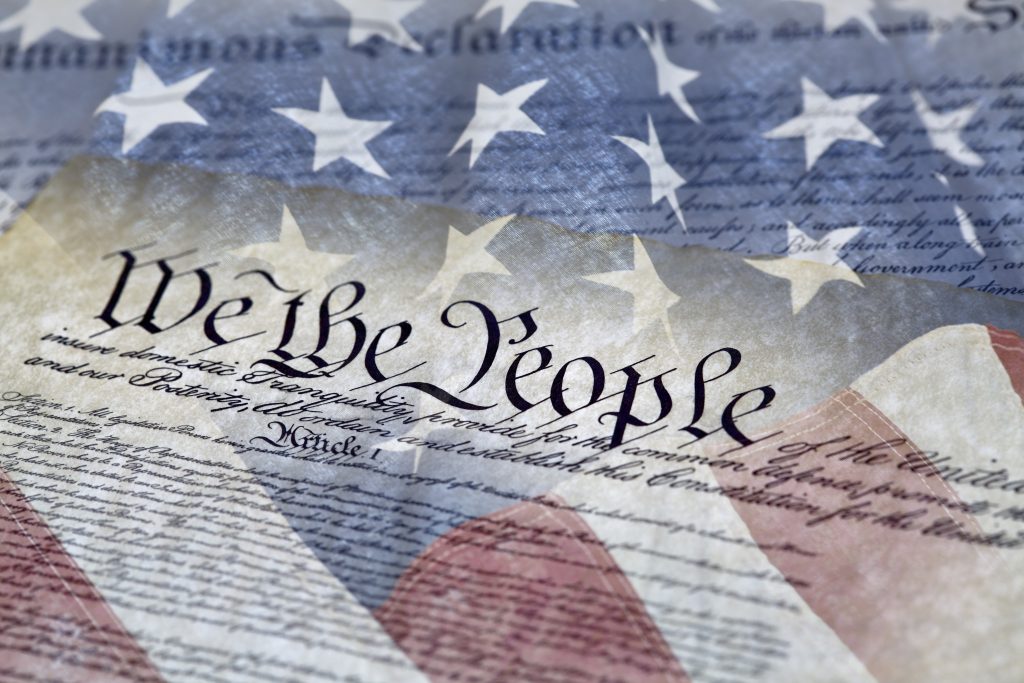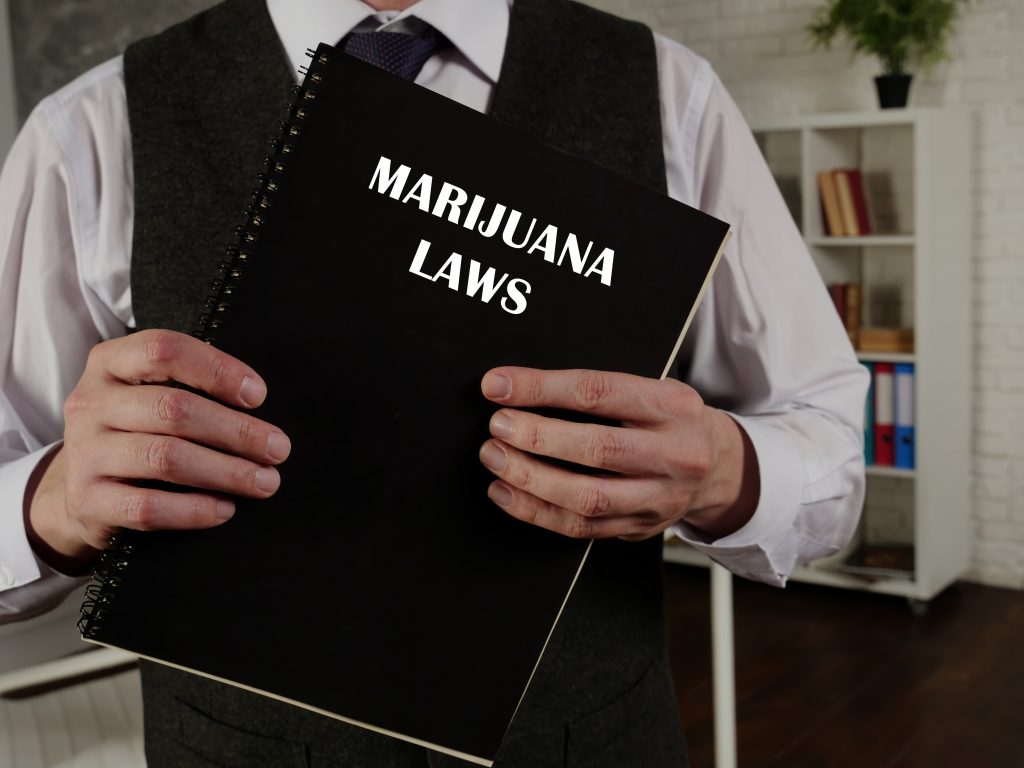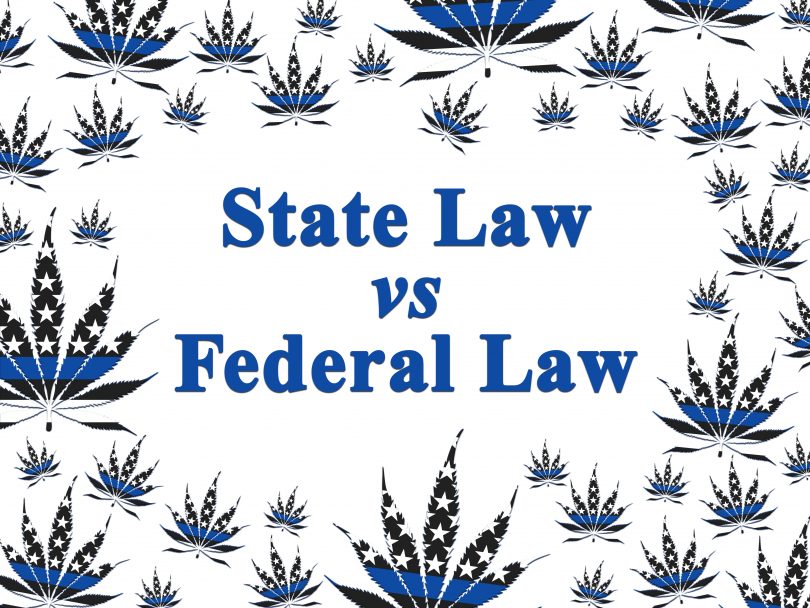The state vs federal government issue has been raging on in the whole cannabis debate, since states started breaking with federal prohibition. With 18 states now legalized for recreational cannabis, (and more on the way), the question now becomes, how many states must change their cannabis laws before the prohibition mandate of the federal government is invalidated?
How many states must change their cannabis laws before a federal government mandate can be invalidated? Hard to say, but luckily, this question does nothing to stop the burgeoning cannabis industry where it has already been legalized. And a growing industry means more and better options for you. Case in point, delta-8 THC. This alternate THC compound doesn’t produce anxiety like delta-9, and provides a clear-headed, energetic high. Preferable for many users. Check out our array of delta-8 THC, delta 10, THCV & THC-O deals, and be glad that the constitution does not actually prohibit cannabis.
Federal laws vs states’ rights
One of the tenants of the US constitution is that the federal government does not get full and complete power, and that each individual state has the right to ‘states’ rights’. These laws, enacted by individual states, do not have to match with the federal government, and can be in direct violation of federal law. The cannabis issue is one of the best high-profile examples of inconsistency between federal and state laws.
However, this doesn’t always hold, and we know this. If the US Supreme Court makes a ruling to legalize something like abortion, no state has the ability to illegalize it, though they can institute a lot of measures that make receiving one difficult. When looking at a subject like gay marriage, it almost looks like states can go against the Supreme Court ruling of 2015 which legalized gay marriage federally. Almost.
But a closer look makes clear that though many states still have outdated laws on their books – and refuse to change them – that these laws are not actually enforceable. That’s because the same-sex marriage law, much like the law legalizing abortion, came from Supreme Court rulings, not from legislative measures. This is how it works: the federal government has something called the Supremacy Clause: Article VI, Clause 2 of the US Constitution. It says:

“All Debts contracted and Engagements entered into, before the Adoption of this Constitution, shall be as valid against the United States under this Constitution, as under the Confederation.
This Constitution, and the Laws of the United States which shall be made in Pursuance thereof; and all Treaties made, or which shall be made, under the Authority of the United States, shall be the supreme Law of the Land; and the Judges in every State shall be bound thereby, any Thing in the Constitution or Laws of any State to the Contrary notwithstanding.
The Senators and Representatives before mentioned, and the Members of the several State Legislatures, and all executive and judicial Officers, both of the United States and of the several States, shall be bound by Oath or Affirmation, to support this Constitution; but no religious Test shall ever be Required as a Qualification To any Office or public Trust under the United States.”
This sounds weird, because we do have states’ rights…right? States’ rights are given in the 10th Amendment of the US Constitution, and are stated as follows:
“The powers not delegated to the United States by the Constitution, nor prohibited by it to the States, are reserved to the States respectively, or to the people.”
What this amendment actually makes painfully clear, is that individual states only have the ability for separate rights, if it doesn’t contradict with the Constitution. This is why when the Supreme Court makes a ruling, it must be followed, because the Supreme Court is a constitutional court, whose job it is to interpret the Constitution. Since a state cannot actually go up against the constitution, it must abide by Supreme Court rulings. This is also why, though many states still have laws against gay marriage, and even refuse to remove them in some cases, they don’t actually count for anything if someone wants to sue their state, because the 2015 Supreme Court ruling will back them.
Is cannabis in the constitution?
No, of course not! Not one mention is made to cannabis in the US Constitution, and realistically, at the time the Constitution was written, if cannabis was mentioned, it would likely have been to promote grow laws. There would have been a 0% chance at that time in history that a federal law would’ve been made to prohibit cannabis in any way at all.

Cannabis is therefore not specifically ruled by the constitution, but simply by legislative measures. Measures that themselves, can be judged as either constitutional or unconstitutional by the Supreme Court. Should that ever happen, then whatever law coming out of it would be binding for all states. As of yet, that has not happened (with the exception of minor and highly indirect rulings which don’t make a full judgement on legality). Therefore, individual states have the ability to set their own independent cannabis laws, in spite of the US federal government ban.
So, what would happen if an individual case about the constitutionality of banning cannabis came to the US Supreme Court? If the court ruled that such a ban was unconstitutional, then every state would be obligated to allow recreational cannabis. If, on the other hand, the Supreme Court made a direct ruling saying that the use of cannabis is unconstitutional, then every state would be obligated to illegalize cannabis. None of this has happened yet.
How many states must change cannabis laws before a federal government mandate is invalidated?
So, now we know that the federal government does trump individual states so long as the law in question is backed-up by the US Constitution. And we know that anything not held specifically by the Constitution is up for decision by individual states. The question now becomes, with a growing number of states changing their legal doctrines to allow medical or recreational cannabis, or decriminalization measures (over 80% of the country), all of which go directly against the Controlled Substances Act of 1970, how many states must change their cannabis laws, before the federal government mandate of cannabis being illegal, gets invalidated. Basically, when does the federal government, have to give it up?
Can it be that all states legalize, and yet the federal government still says its illegal? Wouldn’t that make the federal government look incredibly weak if not one state was willing to follow its doctrines? I imagine at a certain point this aspect will be what changes things. The US government won’t want to look horribly weak, so at a certain point, its likely to change tack completely, and go in the other direction. Realistically, it will have to.
The Mexican example
At the end of 2018, Mexico’s Supreme Court ruled that cannabis prohibition laws were unconstitutional. This was based on a concept called jurisprudencia in which the legislative government is overridden by five consecutive Supreme Court rulings that rule in the same manner. When this happened, the Supreme Court issued a directive to the government to update the written laws.
After dawdling like babies and asking for multiple extensions over 2.5 years of time, the Mexican Congress finally dropped the ball completely at the end of April, 2021, and not only did not provide a law at the deadline, but did not ask for an extension, thereby allowing the Supreme Court the ability to officially change laws itself. And it did, on June 28th, 2021, the Court officially dropped the laws of prohibition against personal recreational consumption and cultivation, making Mexico the 4th legalized country.

Why was the Supreme Court growing so impatient? Well, that’s automatically fair, because the government was meant to be doing a job that it wasn’t doing, but on a more practical level, if the Supreme Court can’t give a directive to the legislature, and have it followed, it erodes the power of the court. The Mexican Supreme Court had to legalize, to make sure it was understood that when it gives a directive, it must be followed.
This example is different from the US in that no Supreme Court ruling has been made in the US. Where they are similar, is in the idea of a government body being able to maintain control by having its laws followed. In Mexico, the Supreme Court ultimately dropped the prohibition laws because it had made a ruling that wasn’t being followed, and this threatened its power, and the power of jurisprudencia. In the US, the question is, at what point is the federal mandate invalidated by enough states going against it? With a caveat of, what does that do to the power of the federal government, if every state is against it?
While it could take longer for all states to adopt recreational policies, over ¾ have a recreational legalization, medical legalization, or decriminalization measure, all of which go against the US federal government. While medical legalizations and decriminalization measures are one thing, recreational legalizations really go right in the face of the US government in a more profound way. And there are plenty more on the way, making this a very pertinent question.
What’s the answer?
As far as I can tell, there isn’t a direct one, or at least, not one that’s outright and specific enough to be easily found in online research. I will put this question to constitutional lawyers, and see if I can offer readers a better answer in the future. It is quite possible that there is no specific measure to govern this, and that case law would actually have to be introduced to set some kind of boundary or limit, by which a federal mandate is invalidated by states not following along.
The thing to keep in mind, is Mexico, and the idea of a government, or government branch, not wanting to look weak. How weak would the US government look if every one of its 50 states and five territories enacted contradictory laws? And what could the federal government realistically do if it allowed anything to get to this point? How could it enforce its laws?
On the other hand, after upholding it for so long, giving in is a massive concession that comes with its own amount of hurt pride and general saltiness for representatives who have pushed so hard to keep these prohibition laws intact. Pride can be very destructive, and it can lead people to make bad decisions, even in the face of their own failure.
Conclusion
The question concerning how many states must change their cannabis laws before the federal government prohibition mandate is invalidated, is one that we’ll have our answer to soon enough. It’s quite possible it will simply come in the form of the government realizing at a certain number of states, that laws must change, and then allowing it to happen. It could come through a Supreme Court ruling. And, unless I find something to say otherwise, this could all come to a strange head if all states do adopt contradicting policies.
For right now, the federal government still has enough followers to keep the law how it is. In another five years, the same thing probably can’t be said. After a certain point, if the government wants to maintain its power (or illusion of it), it must legalize cannabis for recreational use.
Hello to all! Welcome to CBDtesters.co, your #1 spot for the most thought-provoking and relevant cannabis-related news from around the globe. Come by regularly to stay in-the-know on the quickly-changing universe of legal marijuana, and join our newsletter list, so you get the updates first.
Disclaimer: Hi, I’m a researcher and writer. I’m not a doctor, lawyer, or businessperson. All information in my articles is sourced and referenced, and all opinions stated are mine. I am not giving anyone advise, and though I am more than happy to discuss topics, should someone have a further question or concern, they should seek guidance from a relevant professional.







